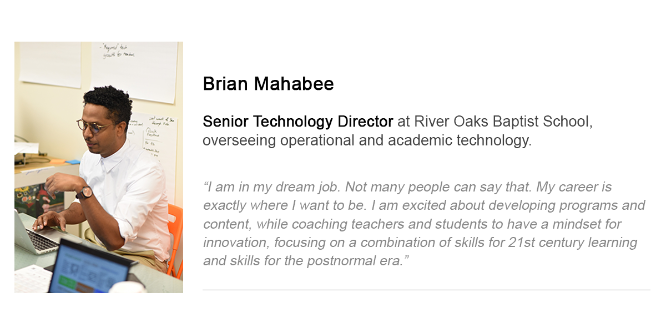
Brian (MA ‘15) currently works as the Senior Technology Director at River Oaks Baptist School, a role that did not exist at the school before he took the position. The school saw a need for the technology department to be led by someone who was an educator first, not just a technologist. He explained, “It was clear to the school that technology should not drive the curriculum; it should not dictate what happens in the classroom. It is the educational understandings that should dictate the use of technology, based on student and teacher needs.”
Prior to joining the Educational Technology Specialist program at Teachers College, Brian’s educational experience was that of a full-time, non-traditional student at the University of Alabama at Birmingham where he also tutored at local libraries and taught homeschool students. When asked about his interest in the program, he explained that he was attracted to the Educational Technology Specialist Program because of his passion for education and technology, the mentorship from Dr. Meier and Dr. Hakim as program advisors, as well as the opportunity to belong to an educational technology community. The ability to acquire State Certification along the way was also a big factor.
“Having a small cohort was the most memorable aspect of the Educational Technology Specialist program.” He said, “Unlike some of the programs with a large enrollment, this program is smaller and fostered really in-depth discussions. I looked forward to hearing and sharing at our table talks. We were able to hear every single opinion and share opposing ideas.”
The program has helped prepare Brian for a range of possible activities as an Educational Technology Specialist, including working with students, teachers, and administrators. Educational Technology Specialists are prepared to take on a variety of roles, depending upon the needs of a school or district. They can work directly with teachers as a technology coach or technology integrator to design authentic classroom projects or take on leadership roles, such as that of a Director of Technology. Educational Technology Specialists also typically work directly with students, and help model the kind of inquiry-based instruction that students need for a 21st century education.
The program provides a K-12 certification, and thus Brian was a student teacher in both an elementary and secondary setting, and he also observed for 100 hours in a number of schools. The exposure to multiple schools and environments prepared Brian for a sophisticated understanding of the role of an Educational Technology Specialist. Brain mentioned he had a number of conversations with different technology directors and personnel who helped guide his thinking about the potential this position offered as he completed the program.
Brian was a part of the extensive school networking available through the program and he got his first career move by connecting with professors from his classes. Brian registered for Professor Buckley’s and Professor Richards’ Managing and Educational Resources course and asked them if he could sit in on the class the following semester because he was so interested in the content. After that, when Brian was in the process of moving out of the state, Professor Buckley put him in touch with someone who helped him bridge to his first career move. Brian subsequently made a second move, to Texas. “I am in my dream job. Not many people can say that. My career is exactly where I want to be. I am excited about developing programs, content and coaching teachers and students to have a mindset of innovation, focusing on a combination of skills for 21st century learning and skills for the postnormal era.”
Since filling this position in Texas, Brian has been able to explore many opportunities. He has overseen technology conferences, served on accreditation committees and provided technology consulting for large school development projects. Brian has supported faculty in his school through the creation of Innovation Camp (InnCamp), a professional development day for all faculty focused on innovation and learning. Through these different opportunities, Brian is able to support students, teachers, and other educators in the use of technology for teaching and learning.
Brian applies the principles from graduate school in his current work as he helps move technology integration toward innovation and cross-curricular project implementations. “I have been able to tip the scales in certain instances regarding the culture of innovation on campus. I am the voice that explains that innovation does not necessarily mean a heavy technological presence, but that it is a mindset, a culture and a concept that should be embraced as a tool to create educational change.”
Learn more about the Educational Technology Specialist M.A. degree program and the admissions process. The program offers two different tracks, both leading to initial K-12 certification from New York State. The first track is for individuals who currently do not hold any state certification or are seeking their first teaching certificate: Technology Specialist for Non-Certified Teachers. The second track is for individuals who already hold a current teaching certificate in another content area: Technology Specialist for Certified Teachers. For additional information, please contact Dr. Ellen B. Meier, Coordinator of the Educational Technology Specialist program, at ebm15@tc.columbia.edu.